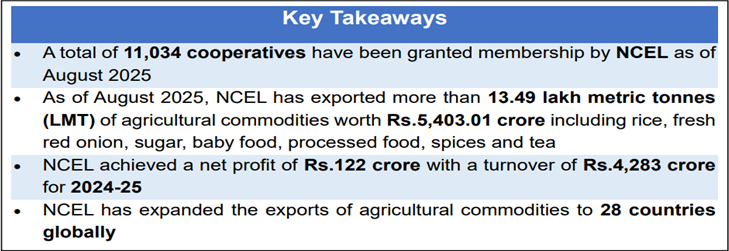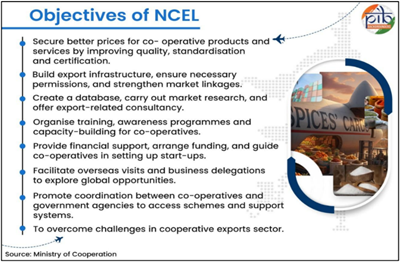

26th September 2025 (13 Topics)
Context:
The National Co-operative Exports Limited (NCEL), registered under the Multi-State Cooperative Societies Act, 2002 in January 2023, has expanded exports worth over ?5,400 crore to 28 countries within two years, positioning itself as the umbrella body for India’s cooperative exports
From Local Cooperatives to Global Markets
- NCEL represents a structural shift in India’s cooperative movement by connecting local produce with international markets, enhancing farmer incomes, and aligning with the vision of Sahakar se Samriddhi (prosperity through cooperation).

Genesis and Institutional Framework
- Formation (2023): Established with a paid-up capital of ?500 crore by five leading cooperatives — IFFCO, KRIBHCO, NAFED, Amul, and NCDC.
- Legal Basis: Registered under the Multi-State Cooperative Societies Act, 2002, which enables cross-state cooperative operations.
- Mandate: To act as a nodal agency for exports, integrating procurement, storage, processing, branding, certification, and marketing.
Achievements and Contributions
- Membership Base: By 2025, 11,034 cooperatives enrolled, including 10,793 PACS and other state/multi-state cooperatives.
- Export Performance: Exported 49 LMT agricultural commodities worth ?5,403 crore, including rice, sugar, spices, processed foods, and tea.
- Profitability: Net profit of ?122 crore with a turnover of ?4,283 crore in 2024–25, also paying 20% dividend to members.
- Market Outreach: Expanded exports to 28 countries, signed MoUs with 61 importers (e.g., Senegal, Indonesia, Nepal).
- Employment and Livelihood: Strengthened rural job creation through value addition, storage, and packaging.

Strategic Significance
- Farmers’ Empowerment: Helps small farmers access global markets by aggregating surplus produce.
- Make in India Push: Enhances India’s agro-processing and branding in global supply chains.
- Whole-of-Government Approach: Collaborates with state nodal agencies, APEDA, and international trade bodies.
- Global Positioning: Enhances branding and competitiveness of Indian cooperative products at internationally benchmarked prices.
Challenges and Concerns
- Competition in Global Markets: Indian cooperatives face strong competition from multinational agribusinesses.
- Quality and Compliance: Meeting international quality, sanitary, and phytosanitary standards remains difficult for small producers.
- Infrastructure Deficit: Cold storage, warehousing, and logistics bottlenecks restrict scale-up.
- Membership Outreach: Need to expand beyond PACS and diversify product portfolio into high-value commodities like organic cotton, marine products, and processed foods.
Way Forward
- Diversification of Exports: Move beyond staples like rice and sugar to niche global demands such as organic produce, pulses, and horticulture.
- International Presence: Establish NCEL offices abroad, especially in Africa and Gulf regions, to strengthen direct linkages.
- Technology Integration: Use digital platforms for market intelligence, demand forecasting, and traceability in supply chains.
- Capacity Building: Train farmers and cooperatives in packaging, certification, and compliance with WTO standards.
- Synergy with Government Schemes: Leverage APEDA, ODOP (One District One Product), and Agri-Infra Fund for infrastructure and market support.
More Articles


